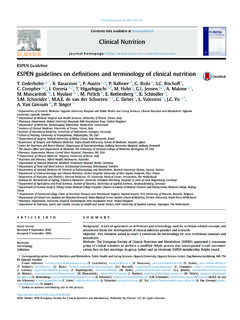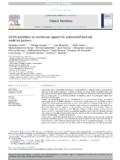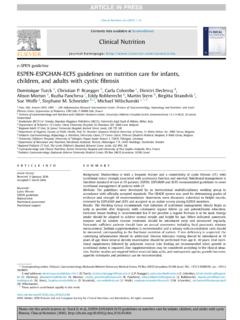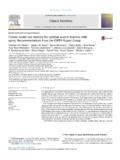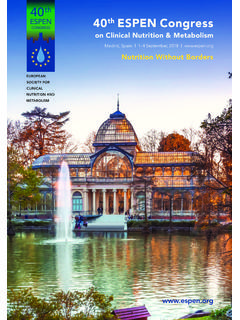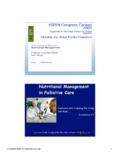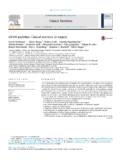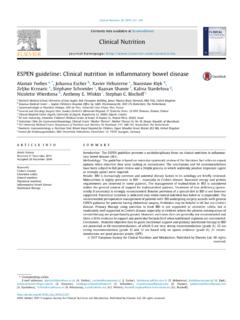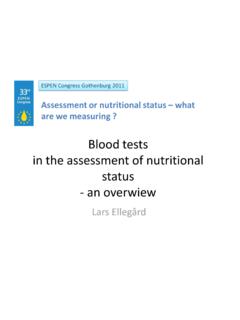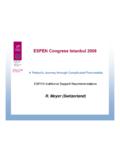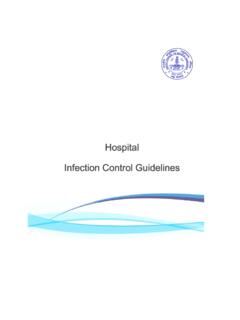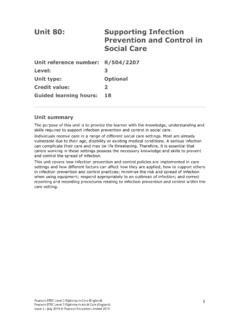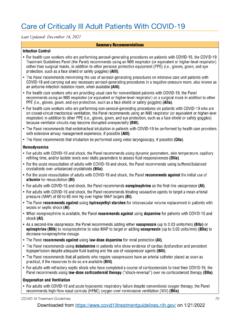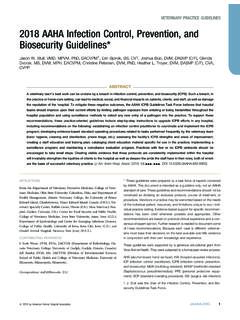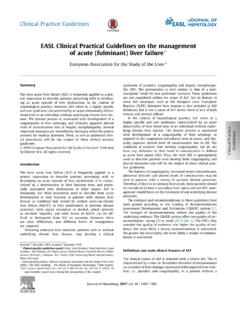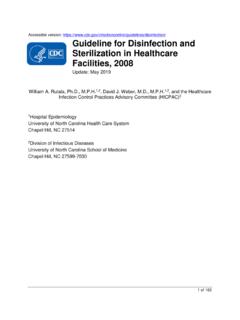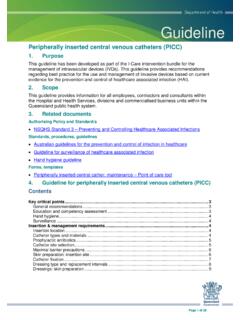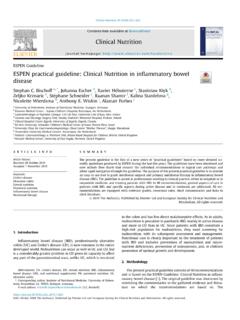Transcription of Espen expert statements and practical guidance for ...
1 Journal Pre-proof Espen expert statements and practical guidance for nutritional management of individuals with sars-cov-2 infection Rocco Barazzoni, Stephan C. Bischoff, Zeljko Krznaric, Matthias Pirlich, Pierre Singer, endorsed by the Espen Council PII: S0261-5614(20)30140-0. DOI: Reference: YCLNU 4212. To appear in: Clinical Nutrition Received Date: 24 March 2020. Accepted Date: 24 March 2020. Please cite this article as: Barazzoni R, Bischoff SC, Krznaric Z, Pirlich M, Singer P, endorsed by the Espen Council, Espen expert statements and practical guidance for nutritional management of individuals with sars-cov-2 infection, Clinical Nutrition, This is a PDF file of an article that has undergone enhancements after acceptance, such as the addition of a cover page and metadata, and formatting for readability, but it is not yet the definitive version of record.
2 This version will undergo additional copyediting, typesetting and review before it is published in its final form, but we are providing this version to give early visibility of the article. Please note that, during the production process, errors may be discovered which could affect the content, and all legal disclaimers that apply to the journal pertain. 2020 Published by Elsevier Ltd. 1 Espen expert statements AND practical guidance FOR NUTRITIONAL MANAGEMENT. 2 OF INDIVIDUALS WITH SARS-CoV-2 INFECTION. 3 Rocco Barazzoni1*, Stephan C Bischoff2*, Zeljko Krznaric3, Matthias Pirlich4, Pierre Singer5;. 4 endorsed by the Espen Council 5. 1. 6 Department of Medical, Surgical and Health Sciences, University of Trieste, Italy 2.
3 7 Institute of Nutritional Medicine, University of Hohenheim, Stuttgart, Germany 3. 8 Department of Gastroenterology, Hepatology and Nutrition, University Hospital Centre Zagreb, 9 University of Zagreb, Croatia 4. 10 Imperial Oak Outpatient Clinic, Endocrinology, Gastroenterology & Clinical Nutrition, Berlin, 11 Germany 5. 12 Department of General Intensive Care and Institute for Nutrition Research, Rabin Medical 13 Center, Beilinson Hospital, Sackler School of Medicine, Tel Aviv University, Tel Aviv, Israel 14. 15 *contributed equally to the manuscript. 16. 17 Corresponding author: 18 Prof. Rocco Barazzoni 19 Dept. of Medical Sciences University of Trieste 20 Strada di Fiume, 447. 21 34149 Trieste 22 Italy 23.
4 24 Email: 25 Tel. +39 040 399 4416. 26. 1. 27 ABSTRACT. 28 The COVID-19 pandemics is posing unprecedented challenges and threats to patients and 29 healthcare systems worldwide. Acute respiratory complications that require intensive care unit 30 (ICU) management are a major cause of morbidity and mortality in COVID-19 patients. Patients 31 with worst outcomes and higher mortality are reported to include immunocompromised 32 subjects, namely older adults and polymorbid individuals and malnourished people in general. 33 ICU stay, polymorbidity and older age are all commonly associated with high risk for 34 malnutrition, representing per se a relevant risk factor for higher morbidity and mortality in 35 chronic and acute disease.
5 Also importantly, prolonged ICU stays are reported to be required 36 for COVID-19 patients stabilization, and longer ICU stay may per se directly worsen or cause 37 malnutrition, with severe loss of skeletal muscle mass and function which may lead to disability, 38 poor quality of life and additional morbidity. Prevention, diagnosis and treatment of 39 malnutrition should therefore be routinely included in the management of COVID-19 patients. 40 In the current document, the European Society for Clinical Nutrition and Metabolism ( Espen ). 41 aims at providing concise guidance for nutritional management of COVID-19 patients by 42 proposing 10 practical recommendations. The practical guidance is focused to those in the ICU.
6 43 setting or in the presence of older age and polymorbidity, which are independently associated 44 with malnutrition and its negative impact on patient survival. 45. 46. 2. 47 INTRODUCTION. 48 The breaking of a COVID-19 pandemic is posing unprecedented challenges and threats to 49 patients and healthcare systems worldwide (1-5). The disease primarily involves the respiratory 50 tract (1-5) but it may deteriorate to multi-organ failure and be fatal (3). Acute respiratory 51 complications that are reported to require prolonged ICU stays are a major cause of morbidity 52 and mortality in COVID-19 patients, and older adults and polymorbid individuals have worst 53 outcomes and higher mortality (1-5).
7 ICU stays, and particularly their longer duration, are per se 54 well-documented causes of malnutrition, with loss of skeletal muscle mass and function which 55 in turn may lead to poor quality of life, disability and morbidities long after ICU discharge (6). 56 Many chronic diseases such as diabetes and cardiovascular diseases and their clustering in 57 polymorbid individuals (7) as well as older age per se (8) are also very commonly associated 58 with high risk and prevalence of malnutrition and worse outcomes. Causes of ICU- and disease- 59 related malnutrition include reduced mobility, catabolic changes particularly in skeletal muscle 60 as well as reduced food intake, all of which may be exacerbated in older adults (6-8).
8 In 61 addition, inflammation and sepsis development may further and primarily contribute to 62 enhance all the above alterations in the presence of SARS-CoV-2 infections . Most importantly, 63 appropriate nutritional assessment and treatment are well-documented to effectively reduce 64 complications and improve relevant clinical outcomes under various conditions including ICU. 65 stays, hospitalization, several chronic diseases and in older adults (6-8). 66 Based on the above observations prevention, diagnosis and treatment of malnutrition should 67 be considered in the management of COVID-19 patients to improve both short- and long-term 68 prognosis. In the current document, the European Society for Clinical Nutrition and Metabolism 3.
9 69 ( Espen ) aims at providing concise experts statements and practical guidance for nutritional 70 management of COVID-19 patients, with regard to those in the ICU setting or in the presence of 71 older age and polymorbidity, which are all independently associated with malnutrition and its 72 negative impact on patient survival. The recommendations are based on current Espen . 73 guidelines and further expert advice. As there are no dedicated studies on nutrition 74 management in COVID-19 infection, the following considerations can currently only be based 75 on the best of knowledge and clinical experience. 76. 77 PREVENTION AND TREATMENT OF MALNUTRITION IN INDIVIDUALS AT RISK OR INFECTED. 78 WITH SARS-COV-2.
10 79 Statement 1. 80 Patients at risk for poor outcomes and higher mortality following infection with SARS-COV-2, 81 namely older adults and polymorbid individuals, should be checked for malnutrition through 82 screening and assessment. The check should initially comprise the MUST criteria* or, for 83 hospitalized patients, the NRS-2002 criteria. 84 *Must criteria: see 85 **NRS-2002 criteria: 86 Identification of risk and presence of malnutrition should be an early step in general 87 assessment of all patients, with regard to more at-risk categories including older adults and 88 individuals suffering from chronic and acute disease conditions. Since malnutrition is defined 89 not only by low body mass but also by inability to preserve healthy body composition and 4.
